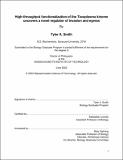High-throughput functionalization of the Toxoplasma kinome uncovers a novel regulator of invasion and egress
Author(s)
Smith, Tyler A.
DownloadThesis PDF (9.460Mb)
Advisor
Lourido, Sebastian
Terms of use
Metadata
Show full item recordAbstract
Protein kinases regulate fundamental aspects of eukaryotic cell biology, making them attractive chemotherapeutic targets in parasites like Plasmodium spp. and Toxoplasma gondii. To systematically examine the parasite kinome, we developed a high-throughput tagging (HiT) strategy to endogenously label protein kinases with an auxin-inducible degron and fluorophore. Hundreds of tagging vectors were assembled from synthetic sequences in a single reaction and used to generate pools of mutants to determine localization and function. Examining 1,160 arrayed clones, I assigned 40 protein localizations and associated 15 kinases with distinct defects. The fitness of tagged alleles was also measured by pooled screening, distinguishing delayed from acute phenotypes. A previously unstudied kinase, associated with delayed death, was shown to be a regulator of invasion and egress. I call the kinase Store Potentiating/Activating Regulatory Kinase (SPARK), based on its impact on intracellular Ca2+ stores. Despite homology to mammalian PDK1, SPARK lacks a lipid-binding domain, suggesting a rewiring of the pathway in parasites. HiT screening extends genome-wide approaches into complex cellular phenotypes, providing a scalable and versatile platform to dissect parasite biology.
Date issued
2022-05Department
Massachusetts Institute of Technology. Department of BiologyPublisher
Massachusetts Institute of Technology